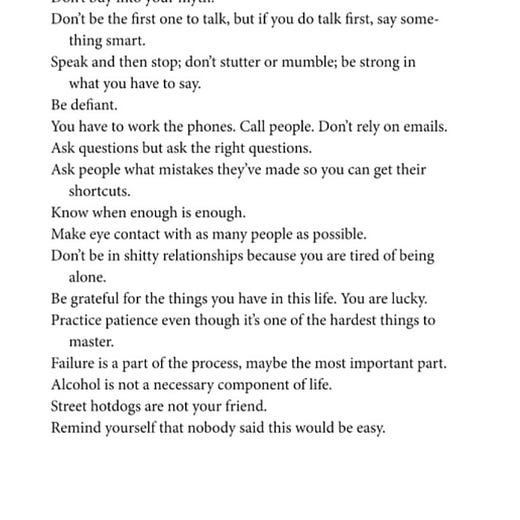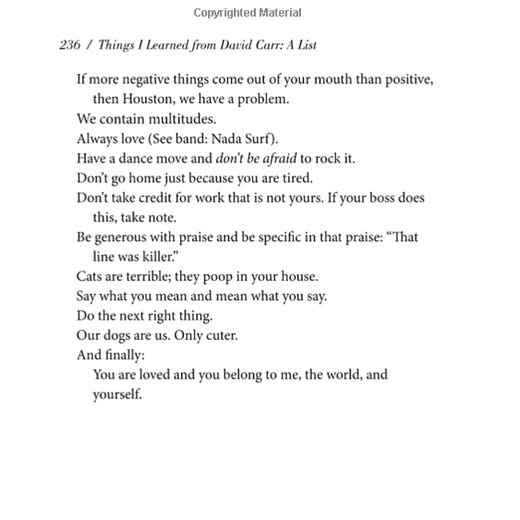What Exactly Defines Your Identity?
One thing I love talking about (that no one else finds nearly as interesting) is the paradox of identity. I’m sure many of you are familiar with the Theseus Paradox, which raises the question of whether an object which has had all its components replaced remains fundamentally the same object.
I probably spend too much time thinking about this stuff, but humor me for a second. Is it your body, your mind, or your outlook that defines your identity? Which ‘you’ do you consider the real you? The person you are today? Five years ago? Five years from now?
The reason this is on my mind is because I was reading more about the complicated life of the late New York Times media columnist David Carr. When I read his articles in my college journalism classes, he was a celebrated writer whose prose we all worshipped. He was also a recovering alcoholic and drug addict who abused women. So who is the real David Carr? In his harrowing 2008 memoir, The Night of the Gun, he investigates and fact-checks the darkness of his own life. Here’s an excerpt on this very topic of identity:
When memory is called to answer, it often answers back with deception. How is it that almost every warm bar stool contains a hero, a star of his own epic, who is the sum of his amazing stories?
If I said I was a fat thug who beat up women and sold bad coke, would you like my story? What if instead I wrote that I was a recovered addict who obtained sole custody of my twin girls, got us off welfare and raised them by myself, even though I had a little touch of cancer? Now we’re talking.
Both are equally true, but as a member of a self-interpreting species, one that fights to keep disharmony at a remove, I’m inclined to mention my tenderhearted attentions as a single parent before I get around to the fact that I hit their mother when we were together. We tell ourselves that we lie to protect others, but the self usually comes out looking damn good in the process.
I don’t know about you, but, man, that hit me hard. Are we all just lying to ourselves to preserve the illusion that we’re the hero of our story — even if we’ve had a checkered past? Carr ends his memoir with the following: “I now inhabit a life I don’t deserve, but we all walk this earth feeling we are frauds. The trick is to be grateful and hope the caper doesn’t end any time soon.”
Carr died after suddenly collapsing in The New York Times newsroom in 2015. His daughter Erin Lee Carr recently wrote a memoir I can’t wait to read called, “All That You Leave Behind,” about her relationship with her dad. My friend Lauren Lachs sent me this excerpted list of lessons from Erin’s book. I hope you enjoy.
More stories for you below:
— The man with the $13 billion checkbook [**HIGHLY RECOMMEND**]
— The apocalyptic presidential candidate
— The unstoppable Missy Elliott
— The world’s last quizmaster
— The convenience store killer
— America’s most popular shoe
— Batman’s favorite app
— The gamified language school
👉 If you enjoy reading profiles of the most successful people and companies, click here to tweet so others can enjoy it too.
PEOPLE TO KNOW.
The man with the $13 billion checkbook: From a tidy glass office in Midtown Manhattan, Darren Walker gives away $650 million a year of other people’s money, and is paid nicely to do so. When he got this job in 2013, as president of the Ford Foundation, he set his sights on tackling inequality, but things quickly got complicated. Walker has some of New York’s best connections, and how he uses his influence could affect philanthropy’s future. (The New York Times)
“Henry Ford never imagined that a black gay man would be president of this foundation, but that’s what’s great about American philanthropy, that it continues to evolve.”
The apocalyptic presidential candidate: Presidential candidate Andrew Yang tells quite the story. He talks about the rise in suicide, the rise in drug overdoses, the increase in the number of people claiming disability benefits. What he describes is a loss of meaning on a massive scale. In Yang’s America, the voting age would be 16, Supreme Court justices would have term limits, Tax Day would be a holiday, Puerto Rico would be a state, and the penny would be eliminated. And that’s just the beginning. (The New Yorker)
“The opposite of Donald Trump is an Asian man who likes math.”
The unstoppable Missy Elliott: Hip-hop legend Missy Elliot is ready to drop long-awaited new music, but she has a different perspective this time around. It’s only now that she realizes her early innovations and creativity were ahead of their time or the influence they would have on other artists. “I was just going, going, going,” she says. In this profile, Missy talks about her childhood, her rise to fame, and what’s in store for the future. (Marie Claire)
“I was just telling somebody that everything I spoke, I’ve done.”
The world’s last quizmaster: The traditional one man band English pub quizmaster is under threat from firms that produce quizzes centrally and supply dozens or even hundreds of venues. Quizmaster Paul Partridge writes his quizzes weekly, drawing on trivia books and formulating news-based questions late in the process to be sure they’re current. But now, he’s facing serious competition from a slew of companies he says are only interested in the bottom line. (Bloomberg)
“This quiz used to be cool. We used to have questions about Evel Knievel—and drugs”
COMPANIES TO WATCH.
The convenience store killer: We’ll go to great lengths to avoid interacting with humans or waiting in lines. In exchange, we’re willing to give up our privacy and be taped & tracked by dozens of cameras operated by Amazon. Amazon’s new Go store does exactly that. From a technological perspective, the Go stores are a marvel—a demonstration of Amazon’s capacity to devote vast resources toward applying the state of the art in AI to an everyday problem. It begs the question — are we just participants in a much larger Amazon-sponsored experiment? (Bloomberg)
“Like so many things Amazon does, I’m sure it doesn’t look at it as a convenience store, doesn’t look at it as a bookstore, but looks at it as a data experiment.”
America’s most popular shoe: Every time I wear my Rothy’s flats, a woman usually stops me and says, “Are those…?” And before she finishes, I already know what she’ll ask. Rothy’s has been relentlessly targeting millennial women via Instagram, urging them to buy the “washable, 3D-knitted flats made from recycled plastic.” Rothy’s has rocketed out of nowhere to $140 million in revenue, mostly built on low-cost social media marketing and word of mouth. Take a look inside its unlikely rise. (Forbes)
“If you have gobs of money, you might be inclined to go out and start buying customers or making dumb decisions.”
Batman’s favorite app: Citizen is a mobile app that sends you real-time alerts about crimes & other emergency situations in your immediate surroundings. It has helped find missing people, rescue abducted children, and alert residents to building fires. But conflicted enthusiasm is common among Citizen users: I don’t know if I want to know, but I can’t not know. (Forbes)
“We were told that we were crazy, that this was reckless and possibly destructive, and we took the risk.”
The gamified language school: Language learning app Duolingo has hooked everyone from Bill Gates, Khloe Kardashian and Jack Dorsey to Syrian refugees in Turkey. “The moment I felt proudest was when I realized, Wow, the richest man in the world is using the same system as the lowest people on the economic scale,” says Duolingo’s founder. The app grabs users with gamification tricks like points, treasure chests and “streaks” for continuous use. It’s addictive in a good way. (Forbes)
“We want to get you to a level where you can get a job, even a high-paying job, using a language you learn on Duolingo.”
Access The Profile archives here.
If you enjoy reading The Profile, tweet to tell others about it. 🙏
If this email was forwarded to you, sign up here.




